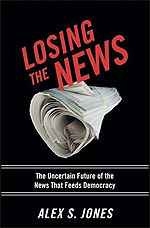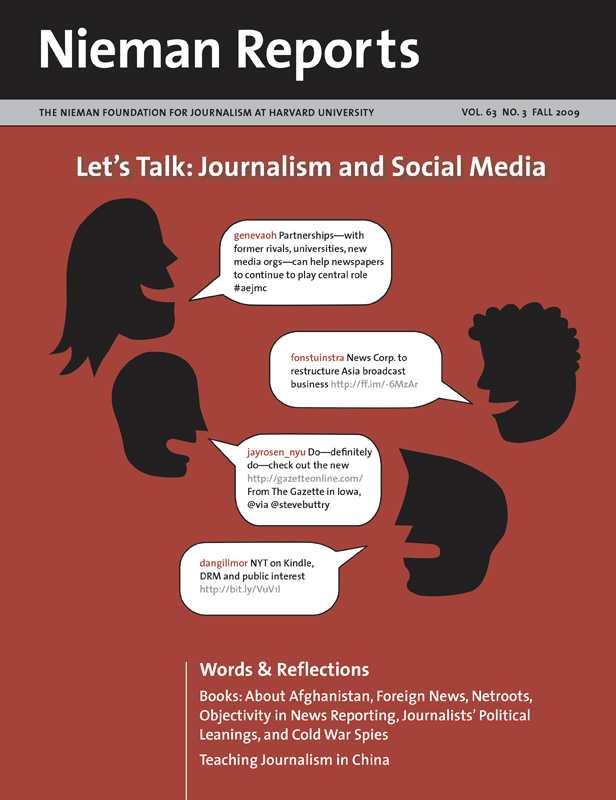In “Losing the News: The Future of the News that Feeds Democracy,” published by Oxford University Press, Alex S. Jones, a 1982 Nieman Fellow and director of the Joan Shorenstein Center on the Press, Politics and Public Policy at Harvard University, describes in its prologue his purpose and intent in writing about the “genuine crisis” in news. “It is not one of press bias, though that is how most people seem to view it,” he contends. “Rather, it is a crisis of diminishing quantity and quality, of morale and sense of mission, of values and leadership.”
In this excerpt from the chapter “Objectivity’s Last Stand,” Jones reminds readers how objectivity assumed its role in the tradition of American journalism, what “authentic journalistic objectivity” looks like when practiced well, and why it matters so much to the future of news reporting.

To my mind, a great deal of what makes journalism good is entwined with what I would term authentic journalistic objectivity, as opposed to the various flavors of phony or faux objectivity. I believe it is essential that genuine objectivity should remain the American journalistic standard, but we may be living through what could be considered objectivity’s last stand.
I define journalistic objectivity as a genuine effort to be an honest broker when it comes to news. That means playing it straight without favoring one side when the facts are in dispute, regardless of your own views and preferences. It means doing stories that will make your friends mad when appropriate and not doing stories that are actually hit jobs or propaganda masquerading as journalism. It sometimes means doing something that probably is not done nearly enough—betraying your sources! A journalist uses charm and guile to help extract information that can benefit the public, and then spills the beans to the public. And sometimes the source of the information feels betrayed. Objectivity also means not trying to create the illusion of fairness by letting advocates pretend in your journalism that there is a debate about the facts when the weight of truth is clear. He-said/she-said reporting, which just pits one voice against another, has become the discredited face of objectivity. But that is not authentic objectivity.
After describing what critics of objective journalism find as its faults and detailing the historical roots of objective journalism, Jones returns to a discussion of how journalism—with objectivity at its core—has been thought of by those who set forth its principles.
But what, exactly, was objective journalism? Were all-too-human journalists supposed to stop being humans and somehow expunge all the prejudices that they carried inside them? Were they to be objective, meaning that they would approach each new subject like a blank slate without opinions? Enemies of objectivity argue that because journalists must be free of bias to be objective, and because this is impossible, it follows that objectivity is a false ideal. As a group, journalists probably have more opinions than most, and it is very rare that a reporter starts working on a story without having some notion as to what happened—in other words, a point of view. But objectivity does not require that journalists be blank slates free of bias. In fact, objectivity is necessary precisely because they are biased.
In their book “The Elements of Journalism: What Newspeople Should Know and the Public Should Expect,” Bill Kovach and Tom Rosenstiel, describe what they call “the lost meaning of objectivity.”… As [they] point out, “In the original concept, in other words, the method is objective, not the journalist.” It was because journalists inevitably arrived with bias that they needed objectivity as a discipline to test that bias against the evidence so as to produce journalism that would be closer to truth.
They argue that the quickening of objectivity as the American journalistic standard was born of a desire to have a more scientific way of approaching news. The nation’s faith in science was surging, and the scientific method seemed suited to journalism. Scientists begin their research with assumptions. They have expectations of what will happen, but they don’t know what will happen. They have, in other words, their own opinions and beliefs—their point of view or even bias—about what is likely the truth, and they do their research to test those assumptions. Their objective, scientific inquiry is not one that is without bias, but one in which bias has to stand up to evidence and results.
But what, exactly, was objective journalism? Were all-too-human journalists supposed to stop being humans and somehow expunge all the prejudices that they carried inside them? Were they to be objective, meaning that they would approach each new subject like a blank slate without opinions?
This is the sensible and realistic approach to objectivity that might be termed genuine objectivity. It begins with the assumption that journalists have bias, and that their bias has to be tested and challenged by gathering facts and information that will either support it or knock it down.
Often, there is information that does both, and that ambiguity needs to be reported with the same dispassion with which a scientist would report variations in findings that were inconclusive. If the evidence is inconclusive, then that is—by scientific standards—the truth.
But journalistic objectivity is an effort to discern a practical truth, not an abstract, perfect truth. Reporters seeking genuine objectivity search out the best truth possible from the evidence that the reporter, in good faith, can find. To discredit objectivity because it is impossible to arrive at perfect truth is akin to dismissing trial by jury because it isn’t perfect in its judgments.
In concluding this chapter, Jones writes:
My sense is that most Americans want the same thing—that their news should be rooted in a verifiable reality that can be confirmed and that faithfully represents the ambiguity that reality usually includes. The national conversation is the means we have for interpreting and analyzing that core of objective news, and it is inherently subjective and opinionated. But if a fundamental confidence in the iron core disappears, if it is viewed as just another collection of facts assembled by someone with a political agenda, then one of the most important supports for our democracy will weaken, and the conversation may well become more of a cacophonous Tower of Babel.



